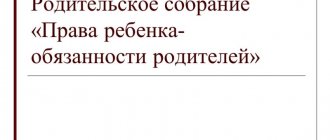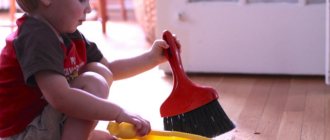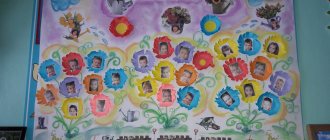Parents' meeting with children: what is it for?
As schoolchildren grow older, problems with academic performance and extracurricular life become more global, so teachers and parents have to act as a united front against the careless student. A parent-teacher meeting with children is a good opportunity to resolve pressing issues, discuss pressing topics and make a plan for the future.
Joint parent-teacher meetings with children are held infrequently; the reasons for such a mass gathering must be valid. Most often this is the analysis of conflict situations, resolving issues regarding the graduation grade and discussing class performance with the selection of individual “instances”.
If the teacher thoroughly prepares for this important event, the meeting takes place in a positive mood and allows for the establishment of invisible contact between the student, the student and his family. This is very important, otherwise the absence of one of the components can destroy the “pyramid” of high academic performance and far-sighted plans for the future.
Joint Meeting Topics
The school administration does not encourage frequent collective meetings, but in some cases such gatherings are extremely important and necessary. Most often this concerns middle school students or graduates who are very soon preparing to enter adulthood. The topics are relevant, so it is best not to miss or ignore a collective event.
First of all, it is worth clarifying that the so-called “mass entertainer” is the class teacher, and it is he who gets the role of the leader, the coordinator of such a stormy communication between several generations. To prevent a meeting at school from suddenly developing into a scandal, it is very important to think through its plan in advance, determine the sequence, prepare additional questions and appoint a chairman who, in addition to actively participating in the conversation, will keep minutes of the parent meeting for reporting to the school management.
But what can we talk about at such gatherings, what topics are considered especially relevant for parents and their children? There are many options, especially since parent-teacher meetings with children most often become unscheduled and emergency. If you don’t need to scold or reprimand anyone, the topics can be educational, generalizing and final. Below are several options.
— “Bad habits in the lives of teenagers.” This topic is relevant at all times, and the problem that has arisen is only “younger” every year. In this case we are talking about smoking, which has a detrimental effect on the physical and social development of the individual. Also in modern society, teenage alcoholism is progressing with all the ensuing consequences. Such troubles need to be discussed collectively so that the child understands what he can expect in life if he foolishly turns away from the right path in life.
- “Communication with peers.” When children grow up, teenage aggression comes from somewhere and spreads not only to parents and teachers, but also to peers. Conflict situations at school are fraught with extremely unpleasant consequences, for example, a decrease in academic performance, possible expulsion, registration in the children's room by the police, misunderstandings with teachers, or calling parents to the teachers' council. Each schoolchild has his own fears about punishment, therefore, in order to avoid such school offenses, he must comply with generally accepted rules and follow the school charter.
— “Romantic relationships at school.” Modern teenagers fall under the eloquent definition of “early”. Too early they consider themselves adults and strive for independence and fateful actions. In the 6th - 7th grade, the first love appears, and such romantic relationships interfere not only with diligent study, but can also put an end to a bright future. In this case, not only parental control is important, but also the direct participation of the school.
— “Appearance of the students.” Already in middle school, schoolchildren begin to express themselves, using revealing and not always appropriate outfits for these purposes. Most often, such ridiculous images arouse increased interest on the part of the school management, and after two appropriate comments, parents will be called to the director. To avoid awkward situations, it is recommended to raise this hot topic at a parent-teacher meeting so that the teacher, in the presence of adults, explains in detail to the students what they should look like at school. Parents will only have to monitor their preparation for lessons, keep things clean and not deviate from the established rules.
— “Progressive subcultures.” In order to once again demonstrate his progressive life position, the student begins to look for himself in various youth directions. One understands that the Goth culture is close to him, another considers himself a follower of the emo generation, the third chooses informal moods. Such methods of self-expression are welcome in modern society, but it is very important that they do not extend to school and the educational process. Here it is important to follow the classic dress code, have a completely neat and well-groomed appearance, and be focused only on studying.
— “Early sexual activity.” The topic “About This” is of interest to all modern teenagers, starting from the 5th - 6th grade. In order to get ahead of unpleasant consequences and promptly protect the student from a fatal mistake, teachers often raise such a piquant topic at a joint parent-teacher meeting. It is necessary to talk about this, especially if parents ignore such topics in a conservative family.
"Selfie." This is a new topic that has appeared on the agenda relatively recently. Instead of lessons, advanced students prefer to photograph themselves, and in the most decent poses. Teachers find this photo hobby strange; moreover, it interferes with the natural educational process and violates order and discipline. It is also worth recalling the harmful influence of mobile gadgets, social networks and, in principle, virtual communication. The harm is obvious; it is advisable to include television and the Internet in the same category. Teachers insist that parents are aware of what their children are doing in their free time.
Recommendations for parents
If a parent happened to attend a joint parent-teacher meeting, it is necessary to clarify all the questions regarding his child that were considered especially important and relevant in the morning. You shouldn’t be shy, much less hush up the problem.
At a parent meeting, you should not start an open conflict with the teacher, since such public friction can only undermine the stable authority of the class teacher in the eyes of the friendly staff.
If there are additional questions regarding your own child, there is no need to make them public. It is best to approach individually after the training camp is over and resolve the issue face to face.
If a student behaves arrogantly and defiantly at a parent-teacher meeting, parents must stop such disrespectful attitude towards themselves and everyone around them. This is very important, otherwise he will feel permissiveness, his own invulnerability.
In the presence of the entire school staff, there is no need to persistently praise your child, putting him above the rest, since none of those present will understand this anyway. It’s better for the teacher to say something good about him, solely on merit.
Upon arriving home after a collective meeting, the parent must have an explanatory conversation with the student about everything he heard. This will be a kind of summing up of the evening in order to understand whether new information has reached the children's consciousness or not. Perhaps in the morning his attitude towards life and school will pleasantly please with its changes.
It only remains to add that joint meetings between parents and students happen infrequently. If the class teacher organizes such a large-scale gathering of two generations, then the reasons for this are compelling and valid. Therefore, it is very important not to miss such an important event, be sure to take part in it. You can learn a lot of interesting things about your own offspring.




